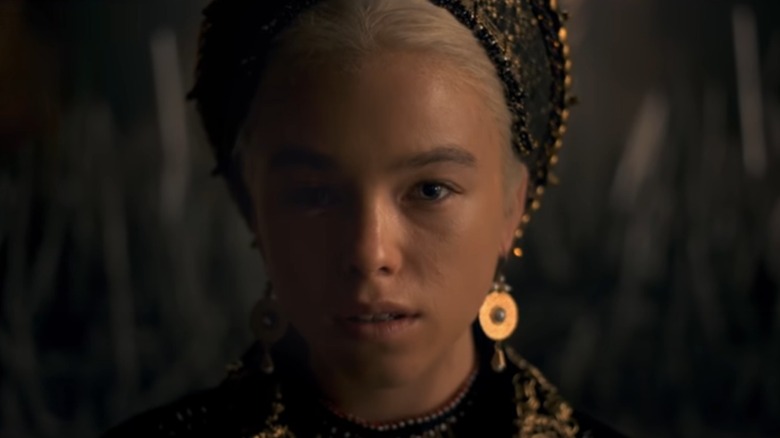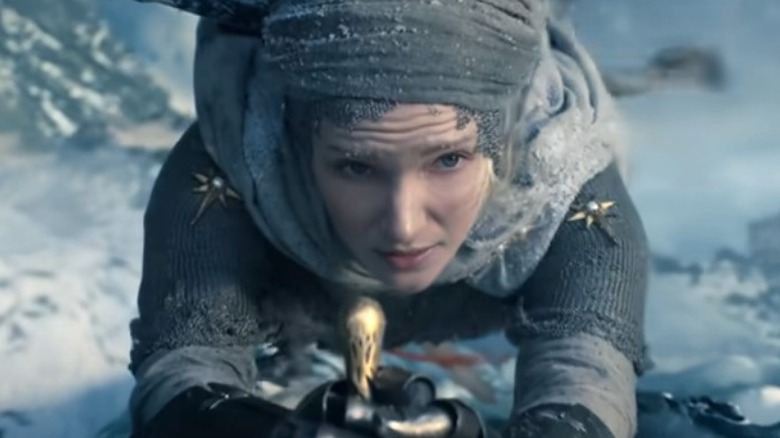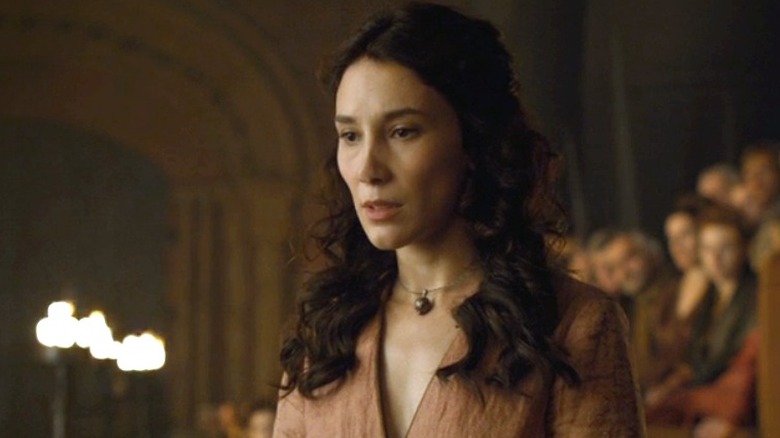Why Some LOTR Fans Would Rather Watch House Of The Dragon Over Rings Of Power
In case you missed it, pop culture appears to have moved on from Viking and Saxon-centered historical fiction, come full circle, and returned to good 'ol fashioned, medieval era-inspired fantasy.
Nearly 70 years after J.R.R. Tolkien first published his bar-setting "The Lord of the Rings" trilogy, Amazon is teaming up with writers Patrick McKay and John D. Payne to either appease or infuriate long-time Middle-Earth fans with "The Lord of the Rings: The Rings of Power." The series, set centuries before the events of in "The Hobbit," will premiere on the streaming service on September 2nd, 2022. Meanwhile, over in Westeros and on HBO, another book adaptation prequel series, "House of the Dragon" (co-written by Ryan J. Condal and the book series' author, George R.R. Martin), will debut on August 21, 2022.
In what can only be described as a very, very foreseeable turn of events, both fans and experts on the book series have opinions, and one of them is this: "House of the Dragon" has a better chance of being good than "The Rings of Power."
This is an understandable theory (or reservation, depending on how you see it), considering the dizzying success of (most of) "Game of Thrones," and the much-discussed failure of Amazon's "The Wheel of Time" adaptation (which Rolling Stone accused of, in their words, "[offering] lovely scenery and little else"). Oddly enough, neither of these points are the main basis for many fans' skepticism.
Fans have more faith in an author-influenced adaptation
In a post on the "Lord of the Rings" subreddit, u/km1181 argued that "House of the Dragon" is the series they have more trust in because, in their words, "The writer of the original books is actively involved."
This is true — Martin revealed as much on his Not a Blog — and a contrast to "The Rings of Power." Tolkien died in 1973 (per The New York Times), so if he were to be "actively involved" in the prequel, it's likely his resurrection would overshadow the series anyway. In fact, many fans are encouraged by Martin's involvement, especially since his absence in the latter half of "Game of Thrones" (via Insider) remains a sore spot for many (via Reddit). For instance, as Reddit fan u/FerBaide wrote in a separate thread, David Benioff and D. B. Weiss, "'House of The Dragon' has George RR Martin himself involved and none of GOT's showrunners that sent the show downhill."
The problem with this theory is that it relies upon the false notion that the more direct and faithful a book adaptation is, the better it is. There are plenty of films and TV shows in the past that have elevated their source material, or offered an equally compelling spin on it, by shaking off the shackles of faithfulness. Stanley Kubrick's drastic alterations to Stephen King's story in "The Shining" may have rather famously displeased the horror writer himself, but it doesn't change the fact that Kubrick's version is a phenomenal film in its own right — one better and more compelling on just about every level than the King-ordered (aka faithful) 1997 TV miniseries that sits as a depressing 36% on Rotten Tomatoes.
Author influence isn't a guarantee of success
It's tempting to want the narrative you fell in love with on the page play out similarly on screen, but this is somewhat narcissistic. Reading is a proactive means of following a story, while viewing is a passive means (hence the two mediums offering differing sorts of engagement of the brain, per Oxford Academic). We want what we read to play out the same way we imagined it because we were the ones imagining it. This creates a kind of ownership over our vision of the story that inhibits us from seeing it in a new light. It's similar to trying (and failing) to revise a sentence you've read so many times your brain literally can't hear or interpret it in any other way.
None of this is to say that input from Martin won't work to the series' benefit, but it's by no means a guarantee. It's equally likely that "The Rings of Power" will succeed because it's not beholden to the author.
For his part, Martin is both aware of the desire for his involvement, and hesitant to fan the assumption that it will translate into adaptation-does-replication. As he writes his Not a Blog, "I think Ryan Condal and his writers made good choices. Even some improvements. (Heresy, I know, but being the author, I am allowed to say so). For years, as some of you may recall, I have been saying the TV version of Shae, as portrayed by Sibel Kekilli, was a deeper, richer, and more nuanced [character] than the Shae in my novels."
Whether or not McKay and Payne will have a similar effect on Tolkien's work remains to be seen, but to automatically assume they can't is a mistake.


